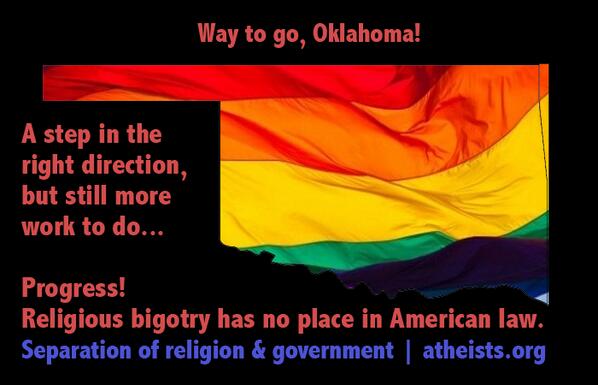I was surprised and pleased to read the news yesterday that Oklahoma has come one step closer to marriage equality, and I was delighted when this little graphic come across my Twitter feed:

Of course, congratulations are not really in order to the people of Oklahoma in general, who voted on November 2, 2004 to approve State Question No. 711 (and thereby constitutionally ban same-sex marriage) by a margin of 1,075,216 to 347,303. That’s under 25% in favor of equal rights for gays and lesbians, so maybe we should save the “Way to go” for someone else, such as the plaintiffs who doggedly pursued this case from 2004 until today, and who will no doubt continue to do so as it is appealed up to the Tenth Circuit Court. Shamefully enough, a supermajority of the State still stands firmly on the side of religious bigotry, and are no doubt upset that “the will of the people has once again been ignored by the federal government,” as Governor Mary Fallin put it, thereby cloaking an irrational and faith-based policy of discrimination in the faux-legitimacy of majoritarianism.
Lest there be any doubt as to whether faith-based morality and religious bigotry are really at the root of this problem, Republican politicians here in Oklahoma have made it fairly clear why they supported a constitutional ban on same-sex marriage in the first place:
“To recognize something other than what God has ordained as traditional marriage obviously detracts or deteriorates the importance of the traditional marriage.” – Todd Hiett
“This is a Bible Belt state . . . . Most people don’t want that sort of thing here. . . . Gay people might call it discrimination, but I call it upholding morality.” – Bill Graves
“If you believe in Christ, if you believe in this country, and if you believe in this city, you believe that marriage is a covenant between God, a man, and a woman.” – Bill LaFortune
“As Christians, we are called to love homosexuals, but I hope everyone at this rally knows the Scriptures prohibit homosexual acts.” – James Williamson
Those are all quotes pulled from the case itself, in case you were wondering why I stopped at only four. At any rate, it seems that American Atheists were not being unduly hyperbolic to characterize this as a situation wherein religious bigotry has found a place for itself in American law. What is the appropriate legal response to such faith-based legislation? This issue was addressed head-on in Judge Kern’s decision:
The Court recognizes that moral disapproval often stems from deeply held religious convictions. See Lawrence, 539 U.S. at 571 (explaining that moral disapproval of homosexual conduct was shaped by “religious beliefs, conceptions of right and acceptable behavior, and respect for the traditional family”). However, moral disapproval of homosexuals as a class, or same-sex marriage as a practice, is not a permissible justification for a law.
Even under the rational basis test, the lowest level of judicial scrutiny, faith-based moral disapproval fails to pass muster. In our democracy, you cannot pass laws to put your personal religious convictions into practice if you don’t have a secular rational basis therefor, that is, the sort of reasoning that could persuade people of any faith or none. This is, at bottom, the essence of what secularism entails, and I am proud to live in the nation which first pioneered this concept as a federal constitutional bulwark against the tyranny of the majority.
